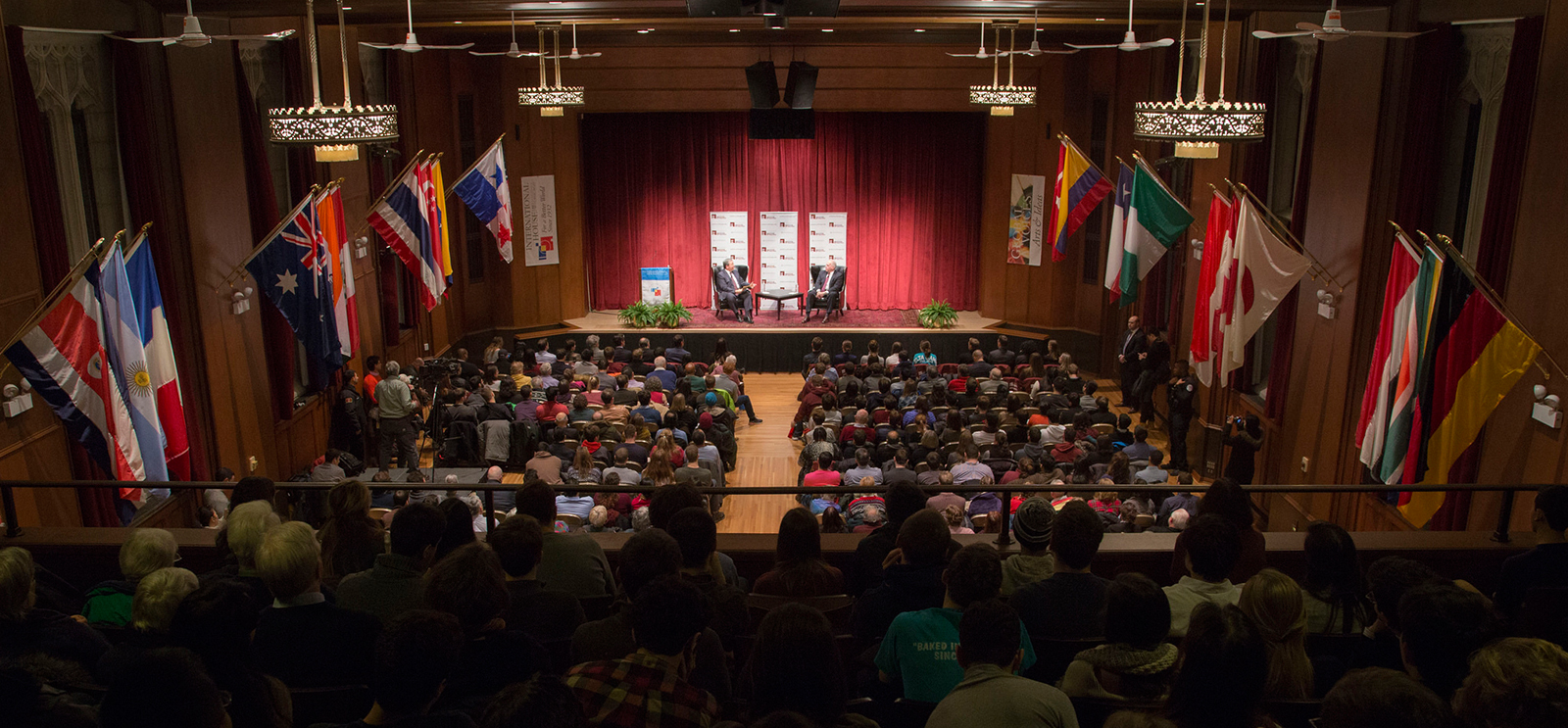
Before meeting president-elect Donald Trump, CIA director John Brennan said, “I am hoping he is going to be respectful of the profession, respectful of the agency.” (Photo courtesy University of Chicago Institute of Politics)
The spy agency’s director spoke the day before his first meeting with the president-elect.
On the eve of his first meeting with president-elect Donald Trump, Central Intelligence Agency director John Brennan said he would give the nation’s new leader “the benefit of the doubt” and looked forward to a “rather robust if not sporty discussion” with him.
At International House on Thursday night, Brennan took questions from Robert Pape, professor of political science, and from members of the packed audience on topics including Russian interference in the presidential election, Trump’s contentious statements about the CIA and FBI, and terrorism.
“I fully anticipate that the incoming administration will have a period of learning about what it is that the CIA does, what the intelligence community does,” said Brennan, who joined the CIA in 1980 and became director in 2013. Each of the five presidents he’s served, he said, arrived in Washington with a different style and understanding of the agency’s work.
“It doesn’t bother me if someone is going to be skeptical and challenge our work,” he said. “But I expect that the president of the United States will recognize that the CIA, the intelligence community were established by statute for a very important reason. … I am hoping he is going to be respectful of the profession, respectful of the agency.”
Throughout the event, which was sponsored by the University’s Institute of Politics, Brennan emphasized the need to understand Russia’s methods and motives for influencing the US presidential election. Brennan said president Barack Obama wants to “tell the world that this is something that you need to be watchful of, and take steps to safeguard your institutions of governance.” And with key upcoming elections in Germany and France, “It was determined that it was very important for the United States to understand exactly what happened here so that we can not only safeguard our system but also make sure that we inform others. By exposing this publicly, it may make [Russian president Vladimir] Putin more reluctant in the future to go down this path.”
Later Brennan responded to an audience member's question about the CIA’s own history of electoral meddling in countries such as Nicaragua and Haiti. “In the past the agency was asked to do some things that by current standards, I think, are seen as beyond the pale,” he said. Today there is broad consensus that interference in elections “is not something we, the United States government, should be involved in at all. The concept of free and fair elections should not just apply to the United States; it should apply to countries worldwide.”
Pape, who studies terrorism, asked Brennan to assess the use of drones as a counterterrorism measure, noting that drone campaigns in Somalia and Iraq appear to have been more effective than those in Afghanistan. Brennan argued that while drones are powerful instruments of war and intelligence gathering, more needs to be done in the Middle East to address the underlying causes of extremism. “It's not a question of just taking terrorists off the battlefield,” he said. The real challenge is to “resolve those underlying factors and conditions that have allowed these safe havens to develop.”
As the event drew to a close, Brennan addressed an audience member’s concern that the CIA and intelligence gathering might be politicized by elected officials including Trump. “Any president could seek to use the CIA to advance their own agenda,” he said.
For that reason, Brennan said, agents are trained to understand the importance of putting information into context, making sure lawmakers are “informed and enlightened” about the intelligence they receive. In the months before the Iraq War, “there was concern within the intelligence community that some individuals in the last administration were looking for intelligence that would justify moving against Saddam Hussein in Iraq. We learned a lot from that process,” Brennan reflected. “We have an obligation to make sure that we push forward the full and comprehensive appreciation of what a situation involves.”
Video
Director of the CIA John Brennan in conversation with professor Robert Pape.
